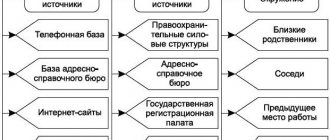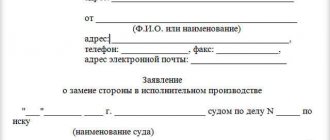In case of prolonged non-payment of alimony, the mother turns to the bailiffs to take appropriate measures against the debtor. But, as practice shows, malicious defaulters not only refuse to pay, but also hide from the creditor and the bailiff in order to avoid liability. Therefore, sooner or later, a FSSP employee is obliged to begin searching for the alimony debtor. How does this procedure take place, and can the search for the debtor be refused?
How is the search for alimony debtor carried out?
The purpose of the search is to establish the location of the debtor, his financial situation in order to bring him to justice and fulfill his alimony obligations. But if alimony debt arises, the search does not begin automatically; this requires your personal appeal. Based on it, a claim proceeding is initiated, the mandatory measures of which are:
- Sending a notification by the bailiff to the alimony payer at the declared or registered place of residence;
- If the debtor makes contact, then the official of the FSSP service will bring to his attention the measures to bring him to justice for non-payment of alimony, as well as the collection procedure and consequences.
The search for the alimony debtor is carried out on the basis of Federal Law 229, Article 65.
If the above conditions are not met and the defaulter cannot be found, he will be put on the wanted list. To do this, it is necessary that, if there is no result after carrying out enforcement measures and the possibility of finding the debtor, the judge approves the decision to begin search activities. The search itself is carried out not only by the bailiff service, but also by internal affairs officers.
Consideration of an application to the FSSP
After registering the submitted application from the claimant, the authorized bailiff must prepare the appropriate decision:
- about putting the defaulter on the wanted list (the official is given up to 3 days to make this decision);
- about refusal to satisfy the applicant’s demands (the response must be prepared within 24 hours).
If you do not agree with the decision made by the FSSP, appeal it to a higher authority. In the text of the complaint, indicate why you believe that your interests and rights were violated by the bailiff’s conclusion.
The search case must be opened within 24 hours from the date of the decision to take enforcement-search measures.
How to make an application to search for alimony debtor
As we have already said, the search for alimony defaulter begins after you submit the appropriate application to the bailiff service. The application is written in any form, but must have a certain structure and content. Read the rules for writing it:
- In the header we indicate the branch of the bailiff service, address;
- Full name of the bailiff who is handling your case;
- Applicant details – full name, residential address, telephone number;
- In the middle, the title of the document is “Application for searching for alimony payer”;
- On the red line, write the essence of the appeal to the FSSP - the formation of alimony debt, the duration, the amount of the debt;
- We indicate all known information about the payer, as well as about persons who may know information about his location, information about property, last place of work, etc.;
- State what you want to achieve by contacting the bailiff - to find the alimony payer and bring him to justice;
- Indicate what serves as the basis for collecting alimony - a writ of execution, a court order or an alimony agreement;
- Date, signature.
The application is considered for three days, after which the bailiff issues a corresponding order to begin search activities.
After you have submitted the application, it is registered, and a copy is sent to the last location of the defaulter. In some cases, if the recipient of alimony has previously filed an application for forced collection of debt and enforcement proceedings have been opened in this case, then the bailiff, without re-applying for search, can independently initiate a search for the debtor.
Sample application to search for alimony debtor
What documents does the bailiff need?
To initiate a search for the debtor, the collector attaches to the application a document confirming the right to collect. To facilitate the activity and speed up the search process, you can provide the bailiff with information about:
- permanent or temporary registration of the wanted person;
- place of work;
- location of property;
- motor transport (state registration number);
- bank accounts;
- the presence of relatives who own real estate that does not correspond to their income level.
Search for a debtor by bailiffs
The bailiff service has a special management department, which is charged with searching for defaulters and bringing them to justice. Their responsibilities for finding the debtor include:
- Obtaining personal data about the defaulter from the internal affairs bodies;
- Submitting a request for the availability of any type of property to the BTI and the traffic police;
- Checking information from the customs service about the possible exit/entry of the debtor;
- Obtaining information from financial organizations about the availability of a bank account with the payer and its actual movement;
- Obtaining data from the tax office, pension fund, registry office;
- Studying various types of documentation that is recorded in the name of the payer;
- Searching and using information about the debtor through social networks and other media;
- Conducting a survey of close relatives, friends, colleagues;
- Departure to the location of the defaulter’s property for inspection and assessment.
If, after investigative measures have been carried out, the last location of the payer was recorded in the territory that belongs to the FSPP service department, then further search and prosecution is carried out by the current bailiff. And if the alimony debtor, according to the latest data, was found outside the territory where the current bailiff is working, then enforcement proceedings are transferred to another body at the intended place of residence of the parent. It is impossible to return the case without taking appropriate measures to search for the debtor by another territorial department of the FSSP. This action is prohibited by law.
The time frame for searching for malicious defaulters on alimony obligations is fixed in Federal Law No. 229, Article 46, and the Civil Procedure Code, Article 278.
As for the duration of the search for debtors, according to the latest changes, these activities are carried out throughout the year. After the expiration of this period and unsuccessful searches, the enforcement proceedings are closed. The creditor may re-apply with a new application, but if search efforts are again unsuccessful, the defaulter may be declared missing.
Where to apply
The search application is submitted to the FSSP department, where enforcement proceedings have been initiated against the alimony payer. Submission can occur either in person to the office of the FSSP department or by sending it by mail.
If you submit an application in person, you need to make sure that the incoming number is indicated on it, and it would be a good idea to copy this number down for yourself (this will make it easier to clarify the results of the progress of the case).
It is worth clarifying that if you send an application by mail, be sure to make an inventory of the attachment, and the letter itself must contain a notification.
Bringing the debtor to justice
If the claimant turns to the FSSP in order to find the defaulter, then this already indicates that evasion of alimony has acquired a malicious nature. In this case, the bailiff must not only search for the defaulter, but if the result is positive, bring him to justice. First of all, administrative measures are applied to the debtor. It could be:
- Ban on traveling abroad;
- Revocation of driver's license;
- Fine up to 25,000 rubles;
- Community service up to 150 hours.
But if the above measures do not have the desired effect on the payer, then all that remains is to bring him to criminal liability. This is possible if alimony has not been paid for more than a year, the debtor provides false information about his income and location, ignores orders and hides from the bailiff. Measures of criminal liability for non-payment of alimony include (Article 157 of the Criminal Code of the Russian Federation):
- Correctional work;
- Arrest for 15 days;
- Imprisonment for up to 1 year.
They can be held criminally liable only after a court decision has been made. However, as practice shows, the use of criminal measures against alimony debtors is extremely rare, in contrast to administrative liability. But if the amount of the debt is quite large and the alimony payer does not have the opportunity to pay it off or he refuses, then, on the basis of a resolution of the FSSP, the property registered in his name can be seized and sold in order to compensate for the debt.
Independent search
If you want to speed up the search process, you can try to find the debtor yourself. Search options:
- Tax authority (if the alimony payer is an entrepreneur, his legal address can be found in the unified register).
- Traffic police (if information about his vehicles is known or, conversely, if you need to clarify the data on vehicles registered to him)
- Through friends.
- Through the Internet.
All information received is transferred to bailiffs for implementation.
Refusal to place a wanted notice
Like any other appeal, a search application may also be rejected. But at the same time, the bailiff must justify his refusal. Depending on the reason for the refusal, you can reapply after a certain time or appeal the decision to a higher authority. If the bailiff’s guilt is proven, he may be fired, deprived of his bonus, or held accountable. When contacting the court or prosecutor's office, you must provide the following information:
- Date of filing the search application;
- Whether your application was accepted or not, if not, what was the reason, and if it was returned back during the consideration process, then on what basis;
- What is the inaction of the bailiff;
- What rules of law were violated.
Thus, we found out that the search for alimony debtors falls on the shoulders of the bailiff service, which is why you need to contact them there. You will be required to write a corresponding statement and prove the fact of non-payment of the debt. The rest depends on the work of the FSPP officer and the internal affairs bodies.
Evasion of alimony payments
Alimony is money that the alimony payer pays for the maintenance of a child or another person.
An agreement on the payment of these financial resources is concluded voluntarily, by drawing up a notarized document by two parties (the alimony recipient and the alimony payer) or through the court.
In both cases, the party that undertakes to transfer money may evade fulfillment of these obligations, either intentionally or unintentionally.
In any case, to force the alimony recipient to pay, he may be put on the wanted list for alimony. This procedure is completely legal and is carried out within the framework of enforcement proceedings.
Requirements for the content of the application
We have already become a little familiar with the contents of the document, but, despite the absence of clearly defined norms, the text must still have a certain gradation:
- A cap. In this part of the paper you need to indicate the name of the court department. bailiffs where the document is sent. Information about the creditor is also indicated in the form of his full name, address and contacts.
- The basis. In the place in question you need to enter information about the debtor. In particular, his full name, date of birth, where he lives (at least the last known information). Indicate the amount of debt. Information about enforcement proceedings. Be sure to include all additional information that is known to the creditors. For example, information about open accounts and which banks have them. You also need to talk about the property that is in the borrower’s possession, even if this property is located in another country.
- Conclusion. The request itself. In this case, you need to ask to put the borrower on the wanted list.
At the very end of the document there is a date and signature. It would be appropriate to include the following information in the content:
- when the case was initiated production;
- by whom in Spanish the document was issued (there may be variations - by a government agency or a judicial agency, through an authorized person, etc.);
- what are the grounds for searching for the borrower;
- information about the property on the territory. Russia and abroad;
- information about accounts in domestic and foreign banks;
- link to article 65 Spanish law production.
But the search request must be legitimate, otherwise the document will be rejected.
The debtor has been found. What's next?
If the wanted person lives outside the region where his search was initiated, information about this must be transferred to the FSSP department from where the request was received. Important: the search may concern not only property registered in the debtor’s name, but also property under his direct control. If it is established that the debtor is the final recipient of any payments (for transactions, for goods or services), a penalty may be imposed on him.
The bailiff, having received information about the location of the debtor and his property, is obliged to take standard enforcement measures by seizing real estate, cars and bank accounts. If we are talking about non-payment of alimony or compensation for harm to health, criminal proceedings may be initiated.
What documents should the bailiff conducting the search have?
The FSSP employee must have the following documents:
- Resolution on initiation of enforcement proceedings;
- Resolution on conducting a search;
- a copy of the writ of execution issued by the court;
- application from the creditor to conduct a search;
- action plan;
- reports on individual actions;
- information received from the State Traffic Safety Inspectorate, Rosreestr and other organizations that can provide information about whether the defaulter has any assets.
The list of documents is not closed. The bailiff can supplement it during the work process.
What has changed in 2021?
In 2021, a new law, Federal Law 229, came into force, according to which the procedure for searching for debtors involves the participation of the Ministry of Internal Affairs and the State Traffic Safety Inspectorate. In particular:
- If bailiffs execute an order to evict a debtor, seize non-residential premises or land, employees of the Ministry of Internal Affairs are obliged to help them with this;
- The traffic police is obliged to transmit to the FSSP information about cars and other vehicles owned by the debtor. Inspectors will be required to inform drivers during roadside checks that a search is being carried out and the vehicle is being seized.
To achieve this, it is planned to automate the exchange of information between the two services.
How long does the search last?
There is no specific period for how long the case can remain in enforcement proceedings, and all this time the search for the alimony holder is carried out. I would like it that way, but no. The period for searching for a debtor is somewhat shorter. Since 2021, a new law has come into force in Russia, according to which the debtor is not wanted for more than a year, since after this time the person can be declared missing through the court, and a pension from the state can be ordered for the loss of a breadwinner (its amount as of 2021 ranges from 5 thousand rubles to 12 thousand rubles, depending on the region of residence).
Who is considered a debtor?
In the standard interpretation, a debtor is any person who has certain obligations to another individual or legal entity
. But not everyone can and should be put on the wanted list.
In most cases, search activities are carried out against citizens whose location is unknown if they have debts for:
- alimony;
- fines in criminal cases;
- compensation for health damage;
- loans.
The amount of debt on the first three points does not matter, on the last - at least 10,000 rubles
with confirmation by a writ of execution or a court decision. In other cases, the search for the debtor is not carried out.
Actions upon detection of a debtor
If the defaulter was discovered, the court. The bailiff can take measures to detain him, because this person will most likely try to escape again.
Much depends on where exactly the borrower was found. If this is ter. another FSSP, then information about the debtor must be forwarded to the authority that is responsible for the region where the borrower is located. The procedure is then handled by local bailiffs.
The debtor receives notice of the commencement of proceedings. They can inform him by mail or phone call. The message contains a requirement to go to the FSSP and pay off the debt.
If the debtor ignores the demand, the adm. will come. responsibility. It may be criminal, but usually such a measure is used extremely rarely. Considering the consequences, it is in the interests of the detected debtor himself to assist the FSSP.
Course of the procedure
Bailiffs are empowered by the state and the court to send requests to any competent authorities:
- Financial and credit institutions.
- Police, traffic police, FMS.
- Tax Inspectorate, Social Insurance Fund, Pension Fund.
- Local authorities, administration, mayor's office.
- Rosreestr.
- Housing and communal services, etc.
All information received in response will help the contractor determine the potential location of the defaulter, establish the level of official income, and the reasons for evading legal requirements. In some cases, a hiding violator will be brought not only to administrative, but also to criminal liability. The latter option will be put into effect if there is irrefutable evidence of malicious intent in the actions of the wanted person.
The general search regulations consist of the following stages:
- Drawing up an event plan.
- Distribution of requests to federal, commercial structures and services.
- Documentation support.
- Direct actions to search for property, an individual, a company.
- Distribution of obligations between members of the operational group and subordinates.
- Control and analysis.
- Filing complaints and petitions to challenge the actions of event participants.
To find a debtor, bailiffs can send requests to various authorities
The current legislation does not regulate a strict procedure for investigative work, therefore a specific plan is determined by a civil servant based on the totality of the circumstances of the case. It is necessary to provide for all possible nuances, factors, and features of a specific situation.
The only requirement for the event is not to affect the constitutional rights and freedoms of citizens, avoid the use of physical force whenever possible, and exclude violence. The bailiff can visit the violator’s last place of residence, inspect real estate, property, and conduct interviews with relatives, colleagues, and spouses.
In practice, in exceptional cases, not only government organizations, but also private investigation agencies and detectives are involved in the procedure. It is important to understand that additional costs for the services of commercial companies will indirectly increase the amount of the defendant’s debt. Initially, the costs are borne by the plaintiff, but the court does not prohibit filing a new claim to compensate for these payments.
The risk for unauthorized activities, violation of these regulations by involved individuals and organizations falls on the contractor. The possibility of using information obtained through private investigation in the course of a search case is confirmed by the written consent of the victim. Additional assistance in finding detained children is provided by advertisements in the media.
When a search is necessary
Not everyone is eager to say goodbye to their money, even borrowed money. Borrowers who are not conscientious try in every possible way to evade fulfillment of the assigned obligations. They hide themselves and hide their property so that it is not taken away as compensation.
That is why the search for the debtor’s property in enforcement proceedings is becoming such a popular service. Sometimes this is the only measure that allows you to receive compensation in an amount as close as possible to the declared amount.
You can apply for a borrower search in the following situations:
- does not pay alimony and hides from paying it;
- if a citizen illegally detains a child to whom he must pay child support;
- if due to the absence of the debtor property claims are impossible;
- has issued loans and does not make payments for compensation;
- ignores fin. compensation for damage to the health/life of a person or his relatives;
- does not compensate for fines for crimes of any nature.
In Part 4 of Art. 65 Federal Law 229 states that bailiffs can, with their own hands or at the request of a person, initiate an all-Russian search. They can search internationally, but only if there are agreements in the country where the person is located.
Is it worth hiding from creditors and the FSSP?
It is impossible to say unequivocally whether it is worth hiding or not. Life is multifaceted and unpredictable. A person may not even suspect that he is on the federal wanted list. They can only tell him when checking at the airport that leaving the country is prohibited. What should a person do if he is put on the wanted list? In any case, this problem must be solved. Otherwise, you will have to live in other people’s apartments all your life and shudder at the sight of an Interior Ministry officer.
How to find a defaulter
The search for the defaulter is carried out by an employee of the FSSP and consists of the following:
- surveys of acquaintances and relatives of the alimony provider;
- inspection of residential and non-residential premises to which the defaulter is related;
- sending requests to various government and banking organizations in order to obtain information about the whereabouts of the debtor (police authorities, pension fund of the Russian Federation, property registration authorities, customs, tax authorities, etc.);
- dissemination of information about the search in the media;
- other actions.
How to find out where the debtor works? For this purpose, FSSP employees send requests to interacting authorities. If the person is not officially employed, then most likely not. If the debtor works for labor, then through the tax service.
In addition, the FSSP employee sends a request to the department of internal affairs at the place of registration of the debtor, asking for assistance in finding him. If the search is not successful, the person may be put on the federal wanted list. And this is already criminal prosecution. Thus, the debtor will be wanted when trying to cross the state border or when contacting any government agency throughout the entire territory of Russia, and not within the administrative unit.
What are the powers of bailiffs?
If an application was received to search for a debtor who is hiding, and it was granted, the bailiffs are vested with broader powers. The purpose of this solution is to make it easier to find a borrower who can use both legal and illegal methods to avoid paying debts.
The bailiff's job is to prevent him from doing this. Therefore, bailiffs can use several measures to significantly complicate the life of a careless borrower:
- Processing of personal data and other information that may be needed when searching for a person who does not want to be found.
- Conducting inquiries to banks and other institutions where the borrower may have accounts.
- Require the presentation of identification documents if there is reason to believe that a specific person is wanted.
- Interview citizens, especially for close relatives, who can hide the debtor, helping him evade obligations.
- Make announcements in the media and online resources about the search for a person who is considered a debtor.
- Inspect the borrower's property.
- Restrict human movement. For example, ban travel to other countries.
In other words, the bailiff can do everything within the legal framework to find the culprit.






